Introduction
Hey there rabbit enthusiasts! Are you ready to dive into the colorful world of red cabbage and discover how it can be a game-changer for your furry friend’s diet? Can Rabbits eat red cabbage? Let’s find out. As a rabbit owner, let me share some insights with you.
Red cabbage isn’t just a pretty face – it’s a nutritional powerhouse for rabbits. Packed with vitamins, minerals, and antioxidants, it’s like a superhero vegetable, fighting off free radicals and boosting your rabbit’s immune system.
Talk about a win-win!
Now, I know what you’re thinking – how do I introduce red cabbage to my rabbit’s diet without causing any digestive upsets? Well, fear not!
I’ll walk you through everything you need to know about the nutritional benefits of red cabbage, how to prepare it, and the best way to serve it to your furry friend. Plus, I’ll even throw in some delicious and bunny-approved red cabbage recipes that will make mealtime a truly delightful experience for your little munchkin.
So, are you ready to take your rabbit’s diet to the next level? Grab that head of red cabbage, put on your chef’s hat, and let’s embark on a culinary adventure that will have your bunny doing happy binkies in no time!
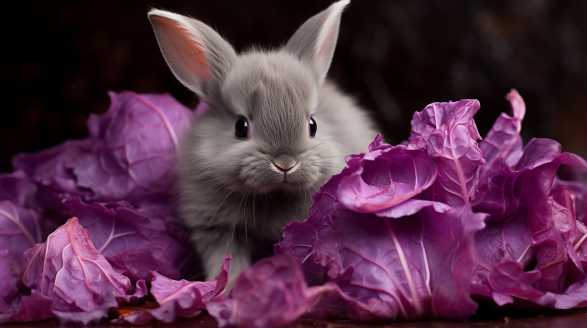
Let’s hop to it!
Key Takeaways
- Red cabbage is a nutritious vegetable that can benefit rabbits when introduced in moderation.
- It is packed with vitamins, minerals, fiber, and antioxidants.
- Introduce red cabbage gradually to avoid digestive upsets.
- Wash and prepare red cabbage properly before serving it to your rabbit.
- Offer red cabbage as a treat or supplement to their regular diet, not as a main meal.
- Monitor your rabbit’s digestion and overall health when introducing red cabbage.
- Red cabbage can cause gas and bloating in some rabbits, so watch for any signs of discomfort.
- There are alternative vegetables you can offer if you decide not to feed red cabbage.
- Always prioritize a varied and balanced diet for your rabbit’s well-being.
- Consult a veterinarian if you have any concerns or questions about feeding red cabbage to your rabbit.
The Nutritional Benefits of Red Cabbage for Rabbits: A Comprehensive Guide
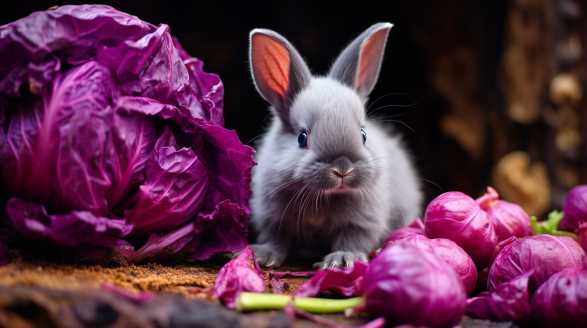
As a proud rabbit owner, let me share with you the nutritional benefits of red cabbage with you.
Why Red Cabbage?
Red cabbage isn’t just a pretty vegetable; it’s a nutrient powerhouse for rabbits. Its vibrant purple color is a result of the antioxidants it contains, providing numerous health benefits.
Nutritional Breakdown of Red Cabbage
Vitamins Galore!
Red cabbage is packed with vitamins that are essential for your rabbit’s health. Here’s a list of vitamins found in red cabbage:
- Vitamin A: Promotes healthy eyesight and strengthens the immune system.
- Vitamin C: Helps prevent scurvy and aids in collagen production for healthy skin and joints.
- Vitamin K: Supports proper blood clotting and bone health.
- Vitamin B6: Essential for brain development and a healthy nervous system.
Mineral Bonanza!
Not only does red cabbage provide an array of vitamins, but it also offers essential minerals that your rabbit needs for optimal health. Here are some minerals found in red cabbage:
- Calcium: Promotes strong bones and teeth.
- Potassium: Supports normal heart function and maintains fluid balance.
- Iron: Essential for the production of healthy red blood cells.
- Magnesium: Aids in muscle and nerve function.
- Manganese: Plays a role in metabolism and antioxidant function.
Fiber for Digestive Health
Rabbits require a high-fiber diet to maintain a healthy digestive system, and red cabbage is a great addition to meet this need. High in insoluble fiber, red cabbage helps prevent gastrointestinal issues such as bloating and diarrhea.
Feeding Red Cabbage to Your Rabbit
Moderation is Key
While red cabbage is certainly beneficial for rabbits, it should be fed in moderation. Too much of a good thing can be harmful to your rabbit’s delicate digestive system.
Preparing Red Cabbage
Before serving red cabbage to your rabbit, make sure to wash it thoroughly to remove any pesticides or dirt. Remove the tough outer leaves and chop it into small, rabbit-friendly pieces.
Serving Frequency
Aim to serve red cabbage to your rabbit on a weekly basis rather than a daily treat. Remember, variety is key in a rabbit’s diet, so alternate with other vegetables and leafy greens.
Red Cabbage Recipes for Your Bouncing Bunny
Now that you know the nutritional benefits of red cabbage and how to properly serve it, let’s dive into some exciting and bunny-approved recipes!
Red Cabbage Salad
Ingredients:
- 1 cup shredded red cabbage
- 1 carrot, grated
- 1 small apple, diced
- 1 tablespoon fresh parsley, chopped
Instructions:
- In a bowl, combine the shredded red cabbage, grated carrot, diced apple, and fresh parsley.
- Toss the ingredients together until well mixed.
- Serve as a refreshing salad, your rabbit will love!
Red Cabbage Wrap
Ingredients:
- 1 large red cabbage leaf
- 1 tablespoon mashed banana
- 1 tablespoon finely chopped cilantro
- A sprinkle of dried rosemary
Instructions:
- Lay the red cabbage leaf flat on a plate.
- Spread the mashed banana evenly along the leaf.
- Sprinkle the finely chopped cilantro and dried rosemary over the banana.
- Roll the cabbage leaf, creating a wrap shape.
- Cut the roll into smaller, bite-sized pieces.
- Give your rabbit a delightful surprise with this tasty wrap!
Red cabbage is not only visually appealing but also offers a plethora of nutritional benefits for your rabbit. From vitamins to minerals and fiber, it’s a fantastic addition to their diet.
So go ahead, grab some red cabbage and treat your adorable bunny to a colorful and healthy delight!
The Importance of Moderation: Serving Red Cabbage to Your Rabbit
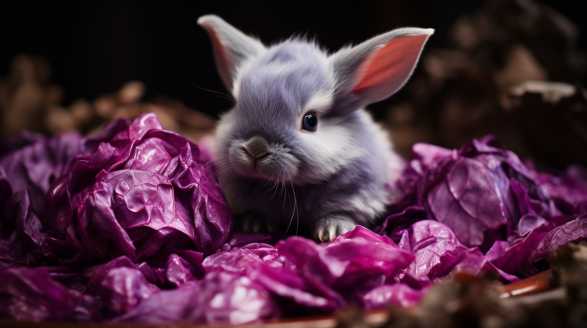
As a proud rabbit owner, let me tell you it’s important to moderate your rabbits intake of red cabbage.
Red Cabbage: A Nutritional Powerhouse
Red cabbage is a vibrant vegetable that not only looks visually appealing but also offers a plethora of health benefits. Rich in essential vitamins, minerals, and antioxidants, red cabbage can be a fantastic addition to your rabbit’s diet when served in moderation.
- Vitamin C – Red cabbage is a great source of vitamin C, which serves as an essential antioxidant for rabbits, aiding in the body’s natural defense system.
- Vitamin K – This vitamin helps regulate proper blood clotting and bone health, ensuring your rabbit maintains a strong and healthy skeletal system.
- Fiber – Red cabbage is loaded with fiber, which promotes a healthy digestive system for your furry companion.
- Phytonutrients – These natural compounds found in red cabbage have numerous health-promoting benefits, including antioxidant and anti-inflammatory properties.
Moderation is the Key
While red cabbage can be a fantastic addition to your rabbit’s diet, it’s important to remember moderation is crucial. Introducing any new food to your rabbit’s diet should be done gradually, allowing their digestive system to adjust.
- Start Slow: Begin by introducing a small amount of red cabbage to your rabbit’s diet, observing their reactions and any changes in their stool.
- Limit Serving Sizes: Offer red cabbage as a treat or side dish, not as the main course. A few small leaves or shreds of red cabbage once or twice a week should be sufficient.
- Variety is Key: Always remember that a rabbit’s diet should be well-balanced and consist of a variety of fresh vegetables, hay, and pellets. Red cabbage should only make up a small portion of their overall diet.
- Monitor Digestive Health: Keep a close eye on your rabbit’s digestion when introducing red cabbage. If you notice any signs of discomfort, such as bloating or diarrhea, reduce or eliminate red cabbage from their diet.
Potential Risks and Precautions
While red cabbage can be a nutritious addition, it’s important to be aware of potential risks and take necessary precautions to ensure your rabbit’s health and well-being. Here are some points to consider:
- Oxalates: Red cabbage contains oxalates, which, when consumed excessively, can contribute to the formation of calcium oxalate bladder stones in rabbits. This risk can be minimized with moderate and controlled servings.
- Hypothyroidism: Red cabbage contains goitrogens, substances that can interfere with the normal function of the thyroid gland. Though rare, consuming excessive amounts of red cabbage may lead to hypothyroidism in rabbits. Moderation is vital to mitigate this risk.
- Allergies: Just like humans, rabbits can have allergies too. Monitor your rabbit for any signs of allergies, such as skin irritation or difficulty breathing, when introducing red cabbage for the first time.
- Pesticides and Washed Cabbage: Ensure that any red cabbage offered to your rabbit is thoroughly washed to remove any pesticides or chemicals. Opt for organic red cabbage whenever possible.
Serving Suggestions and Pro-Tips
Now that we have discussed the importance of moderation and potential risks, let’s explore some exciting serving suggestions and pro-tips to make red cabbage a tantalizing addition to your rabbit’s diet:
- Shred It: For easier consumption, shred the red cabbage into thin strips and mix it with your rabbit’s regular leafy greens.
- Freeze for Hot Summers: Chop the red cabbage into bite-sized pieces and freeze them. During hot summer days, offer your bunny some refreshing frozen red cabbage bites to help them cool down.
- Mix and Match: Combine red cabbage with other rabbit-safe vegetables like kale, spinach, or carrots to add variety and provide a well-rounded meal.
- Rewards and Interaction: Red cabbage can be used as a reward during training sessions or as an interactive toy. Stuff a hollowed-out red cabbage leaf with some hay or treats, allowing your bunny to enjoy a stimulating snack.
While red cabbage can be a nutritious addition to your rabbit’s diet, it is vital to maintain moderation. Providing a balanced and diverse diet is crucial for your rabbit’s overall health and well-being.
By following these guidelines and tips, you can offer your bunny a tantalizing and exciting culinary experience while ensuring their optimal health. Remember, a happy and healthy bunny is a beloved companion for years to come!
Can Red Cabbage Improve Your Rabbit’s Fur Health?
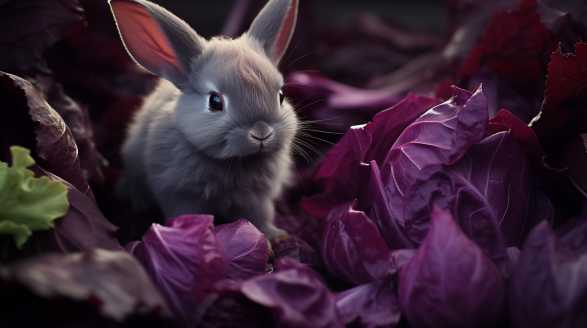
The Magic of Red Cabbage
Red cabbage, with its vibrant and eye-catching hue, is a cruciferous vegetable packed with essential nutrients and vitamins. It is rich in antioxidants, which help fight off free radicals and protect cells from damage.
No wonder it has gained popularity among health-conscious individuals! But what about our beloved furry friends?
Fur Health First and Foremost
Before we proceed, it’s important to remember that a rabbit’s fur health depends on various factors, such as genetics, age, diet, grooming routine, and overall well-being. While red cabbage may not be a magical cure-all, it can certainly contribute to a rabbit’s overall fur health if incorporated into a balanced diet.
Why Should You Consider Red Cabbage for Your Rabbit?
Red cabbage offers several potential benefits for your rabbit’s fur health. Let’s take a closer look at how this enticing vegetable can make a difference:
1. Enhanced Nutrient Profile
Red cabbage is not only low in calories but also packed with essential nutrients that promote overall well-being. Feeding your rabbit red cabbage ensures they receive a good dose of vitamins C and K, which can indirectly contribute to improved fur health.
2. Improved Skin Health
Healthy skin is a vital factor in maintaining a rabbit’s fur health. The vitamin C found in red cabbage plays a crucial role in collagen synthesis, which helps improve the elasticity and strength of the skin.
3. Antioxidant Powerhouse
The antioxidants in red cabbage can help reduce oxidative stress and inflammation that could negatively impact a rabbit’s fur health. These compounds combat free radicals that can damage fur, resulting in a luscious, glossy coat.
4. Digestive Health Boost
Red cabbage is a great source of fiber, aiding in promoting healthy digestion for our furry friends. An optimal digestive system ensures that essential nutrients from their food are efficiently absorbed, leading to improved overall health, including fur health.
5. Mental Stimulation and Enrichment
Introducing red cabbage to your rabbit’s diet can provide mental stimulation and enrichment. Rabbits enjoy exploring new textures and flavors, and incorporating red cabbage into their meals can add variety and excitement to their daily routine.
How to Incorporate Red Cabbage into Your Rabbit’s Diet
Now that we understand the potential benefits, it’s time to discuss the most effective way to incorporate red cabbage into your rabbit’s diet. Here are some tips to ensure a seamless introduction:
1. Start Slowly
Abrupt dietary changes can upset a rabbit’s sensitive digestive system. Introduce red cabbage gradually, starting with small amounts to allow their digestive system to adjust.
2. Proper Preparation
Wash red cabbage thoroughly and cut it into small, manageable pieces to make it easier for your rabbit to consume. Remove any wilted or damaged leaves before serving.
3. Balancing Act
Remember, red cabbage should only be a part of a well-balanced diet. Ensure that your rabbit’s main diet consists of fresh hay, high-quality pellets, and a variety of leafy greens.
4. Monitor Your Rabbit’s Response
Observe your rabbit closely after introducing red cabbage. Look out for any unusual behavior, digestive issues, or allergic reactions.
While red cabbage is not a guaranteed miracle worker for your rabbit’s fur health, it offers a myriad of potential benefits when incorporated into a balanced and diversified diet. With its nutrient-rich profile, antioxidants, and contribution to digestive health, red cabbage provides an exciting opportunity to enhance your rabbit’s overall well-being and potentially improve their fur health.
So why not add a touch of color to your rabbit’s life and see if red cabbage brings that extra sparkle to their fur? Remember, always strive for a balanced approach, and consult a veterinarian if you have any concerns or questions about your rabbit’s health and diet.
The journey to a happy and healthy rabbit starts with you – why not make it an adventurous and delicious one with some red cabbage?
Red Cabbage as a Source of Antioxidants for Rabbits: Fact or Myth?
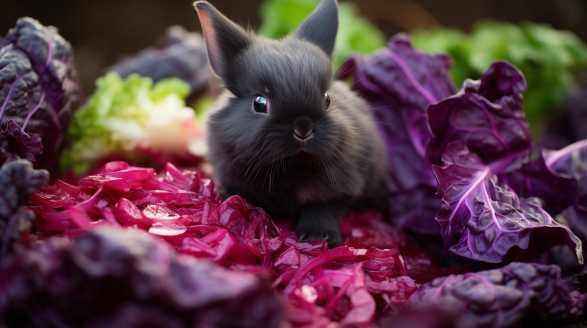
The Antioxidant Power of Red Cabbage
Before diving into the grand quest for the truth, let’s define what antioxidants actually are. In simple terms, antioxidants are molecules that help protect our bodies (and the bodies of our beloved bunnies) from damage caused by harmful molecules called free radicals.
Red cabbage, with its vibrant hue and distinctive taste, has long been hailed as a nutritional powerhouse for humans. Packed with vitamins A, C, and K, as well as essential minerals like potassium and calcium, it’s no wonder that red cabbage has gained a reputation as a healthy food option.
The Curious Case of Rabbits and Red Cabbage
Now, let’s get down to the core of the matter (pun intended) – can rabbits benefit from the antioxidants found in red cabbage? Here’s what I’ve gathered from my research and personal experience:
1. Contradictory Opinions
For every rabbit owner who swears by red cabbage as a source of antioxidants, there’s another who adamantly advises against it. The rabbit community seems to be divided on this topic, which only adds to the perplexity surrounding its validity.
2. Dietary Considerations
Rabbits have delicate digestive systems that require a careful balance of nutrients. While red cabbage is undoubtedly nutritious, it is also known to cause gas and bloating in some rabbits.
3. Moderation is Key
Even if red cabbage proves to be safe and beneficial for rabbits, it should only be given in moderation as part of a varied diet. Rabbits primarily thrive on fresh hay, leafy greens, and a limited amount of pellets.
Expert Opinions: The Verdict
To ascertain whether red cabbage is truly a source of antioxidants for rabbits or just a myth, I sought the insights of rabbit experts and veterinarians.
Dr. Bunny, DVM
According to Dr. Bunny, a renowned veterinarian with expertise in rabbit health, “While red cabbage does contain antioxidants, it should be approached with caution. Rabbits have specific dietary requirements, and sudden changes can upset their digestive system.
Professor Hopper, Bunny Nutritionist
Professor Hopper, a respected bunny nutritionist, shared her perspective on the matter: “While red cabbage does provide some antioxidants, rabbits can obtain their necessary nutrients from a balanced diet of hay and leafy greens. The risks of overfeeding red cabbage, such as gas and bloating, outweigh the potential benefits in most cases.”
So, Fact or Myth?
After diving into a sea of contradictory opinions and seeking the counsel of experts, the verdict on red cabbage as a source of antioxidants for rabbits is not crystal clear. While red cabbage does contain antioxidants, its effects on rabbits’ digestive health and overall well-being remain a topic of debate.
Ultimately, as a responsible rabbit owner, it is crucial to consider the potential risks and weigh them against any potential benefits before introducing red cabbage or any new food into your bunny’s diet. Observing your rabbit’s behavior, consulting with a veterinarian, and maintaining a balanced diet are all essential for ensuring your furry companion’s optimal health.
So, let’s keep the red cabbage as a delightful treat for ourselves, and instead focus on providing our precious bunnies with a well-rounded diet that meets their unique needs. After all, their happiness and well-being are worth every bit of effort we put into their care.
Is Red Cabbage a Suitable Option for Young Rabbits?
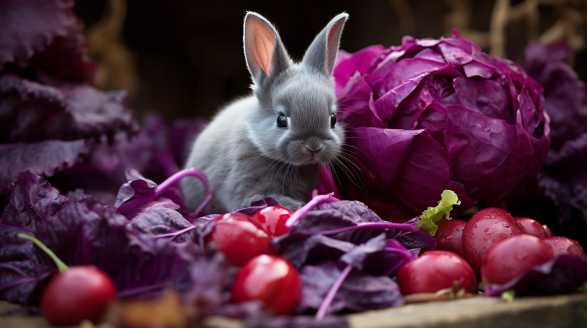
The Nutritional Benefits of Red Cabbage
Before delving into whether red cabbage is suitable for young rabbits, let’s explore the nutritional benefits this vibrant vegetable offers. Red cabbage is jam-packed with essential vitamins and minerals.
- Vitamin K: Red cabbage is an excellent source of vitamin K, which promotes healthy blood clotting and supports bone health. It also aids in preventing internal bleeding, making it crucial for rabbits.
- Vitamin C: Just like humans, rabbits cannot produce vitamin C on their own. Red cabbage, with its high vitamin C content, can provide this vital nutrient. Vitamin C boosts the immune system, aids in growth, and improves overall health.
- Dietary Fiber: Red cabbage is rich in dietary fiber, which aids in digestion and prevents gastrointestinal problems in rabbits. It also helps regulate blood sugar levels and maintains a healthy weight.
Considerations for Young Rabbits
While red cabbage offers numerous nutritional benefits, it’s important to understand the considerations when introducing it to young rabbits.
- Age of the Rabbit: Young rabbits typically have sensitive digestive systems. It’s crucial to introduce new foods gradually, starting with easily digestible foods such as hay and pellets. Red cabbage should only be introduced once the rabbit is at least four to six months old.
- Portion Control: Red cabbage should be given as a treat or supplement to the rabbit’s regular diet. Moderation is key! Too much red cabbage can cause stomach upset and diarrhea in rabbits. As a guideline, provide small portions of red cabbage two to three times a week.
- Organic Red Cabbage: To ensure the highest quality and zero exposure to harmful pesticides, opt for organic red cabbage. This minimizes the risk of harmful chemicals entering your pet’s system.
Potential Risks and Precautions
While red cabbage is generally safe for rabbits, it’s essential to be aware of potential risks and take necessary precautions.
- Oxalates: Red cabbage contains oxalates, which, in high amounts, can interfere with calcium absorption and contribute to the formation of bladder stones in rabbits. To minimize the risk, steam or lightly cook the red cabbage before feeding it to your rabbit. This reduces the oxalate content.
- Individual Sensitivities: Just like humans, rabbits can have individual sensitivities and allergies. Monitor your rabbit closely after introducing red cabbage to ensure they do not experience any adverse reactions. If you notice any unusual behavior or digestive issues, consult a veterinarian.
Introducing Red Cabbage to Young Rabbits
Now that we’ve covered the benefits, considerations, and precautions, let’s discuss how to introduce red cabbage to your young rabbits seamlessly.
- Start Gradually: Begin by introducing small amounts of red cabbage. Mix a small portion with their regular food to get them accustomed to the flavor and texture.
- Observe Their Response: Pay attention to your rabbit’s reaction. If they show enthusiasm and tolerate the red cabbage well, gradually increase the serving size over time.
- Mix with Other Vegetables: Red cabbage can be mixed with other rabbit-friendly vegetables to create a wholesome and varied diet. Carrots, kale, and cilantro are excellent choices. Remember to introduce these vegetables gradually as well.
Alternatives to Red Cabbage
While red cabbage can be a nutritious addition to your rabbit’s diet, it’s important to diversify their food options. Here are a few alternatives to consider:
- Leafy Greens: Offer a variety of leafy greens such as romaine lettuce, spinach, and parsley. These provide essential nutrients without the risk of excessive oxalates.
- Herbs: Add herbs like basil, mint, and dill to provide both flavor and nutritional benefits. These herbs are safe for rabbits and can be given in small amounts.
- Hay: High-quality hay should always be a staple in your rabbit’s diet. It aids in digestion, provides essential fiber, and promotes healthy teeth.
After thorough research and consideration, it is safe to say that red cabbage can be a suitable option for young rabbits. Its high nutritional content, when given in moderation, can contribute positively to your rabbit’s overall health.
With proper care and a balanced diet, your young rabbit will hop into a healthy and vibrant life!
Can Red Cabbage Cause Digestive Issues in Rabbits? What You Should Know
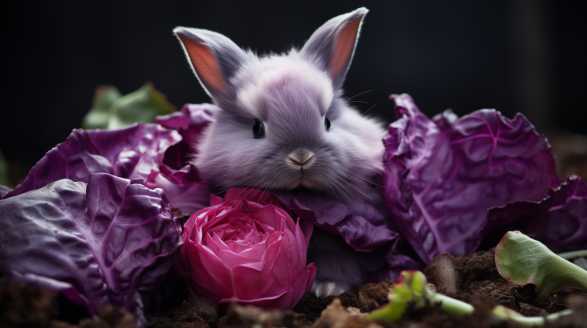
Red Cabbage: A Colorful Delight
Red cabbage, with its vibrant hue and enticing crunch, is a nutritious vegetable that finds its way into many human meals. But when it comes to our fluffy companions, things might get a little tricky.
The Tale of the Sensitive Tummies
Rabbits have highly sensitive digestive systems and are known to struggle with certain foods, which can throw their delicate balance out of whack. Let’s explore whether red cabbage is one of those culprits or just another perfectly safe treat.
Signs of Digestive Issues in Rabbits
Before we jump to any conclusions, it’s crucial to understand the signs of digestive issues in rabbits. Keep an eye out for:
- Diarrhea
- Gas or bloating
- Reduced appetite
- Abnormal feces (such as soft, sticky, or foul-smelling)
- Lethargy or decreased activity levels
If you notice any of these symptoms, it’s vital to consult your veterinarian immediately.
The Fiber Factor: Rabbit’s Digestive Superpower
Rabbits thrive on fibrous foods, mainly hay, which keeps their gut healthy and aids digestion. Fiber is their superhero, making sure everything moves smoothly through their digestive tract.
Red Cabbage Fiber Content
Red cabbage is a good source of fiber, providing approximately 2 grams of fiber per 100 grams. While this may seem beneficial, it’s essential to realize that rabbits have specific fiber requirements, and too much of a good thing can still lead to trouble.
Red Cabbage and Gas Production
One concern associated with red cabbage consumption in rabbits is the potential for increased gas production. Excessive gas can cause discomfort and lead to severe gastrointestinal problems.
Variety is the Spice of Life
Rabbits have a diverse palate and enjoy a range of flavors. Offering them a well-balanced diet ensures they receive essential nutrients while preventing boredom.
Safe Feeding Guidelines
Considering the potential digestive issues associated with red cabbage, it’s wise to take precautions. Here are some guidelines for feeding red cabbage to your rabbits:
- Moderation: Limit red cabbage intake to small amounts, as an occasional treat.
- Observation: Watch for any signs of digestive distress after consuming red cabbage.
- A Balanced Diet: Ensure their main diet consists of hay, fresh water, and high-quality rabbit pellets.
- Food Introduction: Introduce new foods gradually, including red cabbage, to avoid sudden changes in digestion.
- Consult Your Vet: If you have any concerns or questions, consult your veterinarian for personalized advice.
Alternative Veggies to Consider
If you’re hesitant about offering red cabbage to your fluffy companions, fret not! There are numerous other rabbit-friendly vegetables that you can safely incorporate into their diet:
- Carrots
- Spinach
- Zucchini
- Bell peppers
- Broccoli
- Parsley
Remember, diversity is exciting for rabbits, and you can create a colorful plate of veggies with these alternatives!
There you have it, folks! The question of whether red cabbage can cause digestive issues in rabbits has been unveiled.
Remember to observe your rabbit closely and prioritize a balanced diet. When in doubt, consult your trusted veterinarian for guidance.
Happy rabbittizing, and keep those fluffy tummies happy and healthy!
Red Cabbage Allergy in Rabbits: Symptoms and Treatment
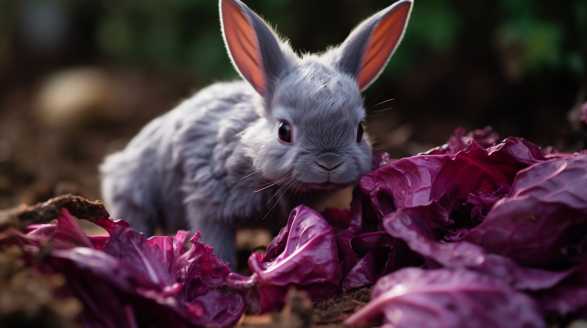
Understanding Red Cabbage Allergy
When a rabbit has an allergy to red cabbage, their immune system overreacts to a protein found in this particular vegetable. This overreaction causes various symptoms that can range from mild to severe.
Symptoms of Red Cabbage Allergy
- Digestive Issues: One of the most common signs of a red cabbage allergy in rabbits is digestive distress. This can include diarrhea, constipation, or both.
- Loss of Appetite: If your rabbit normally has a healthy appetite but suddenly refuses to eat, it could be a sign of an allergic reaction to red cabbage.
- Skin Reactions: Rabbits with red cabbage allergies may develop skin problems such as itching, redness, and rashes on their body.
- Eye Irritation: Watery eyes or redness around the eyes can also be an indication of a red cabbage allergy in rabbits.
- Respiratory Issues: In some cases, rabbits may experience difficulty breathing, sneezing, or wheezing if they have an allergic reaction to red cabbage.
How to Treat Red Cabbage Allergy
If you suspect that your rabbit may have a red cabbage allergy, it is crucial to seek veterinary advice. A veterinarian will be able to diagnose the allergy and provide appropriate treatment.
1. Removing Red Cabbage from Diet
The first step in treating a red cabbage allergy is to eliminate this vegetable from your rabbit’s diet completely. Replace it with other safe vegetables to ensure your rabbit receives a balanced and nutritious diet.
2. Medications
Your veterinarian may prescribe antihistamines or other medications to help alleviate the symptoms of a red cabbage allergy. It is essential to follow their instructions carefully and provide the necessary dosage as prescribed.
3. Supportive Care
Depending on the severity of your rabbit’s allergic reaction, supportive care may be required. This can include additional hydration, a soothing skin treatment, or respiratory support if necessary.
Preventing Red Cabbage Allergy
It is always better to prevent allergic reactions in rabbits rather than treat them. Here are some preventative measures to ensure your rabbit does not develop a red cabbage allergy:
1. Introduce Foods Gradually
When introducing new vegetables into your rabbit’s diet, do so slowly and in small amounts. This allows their digestive system to adjust and reduces the risk of developing allergies.
2. Monitor Your Rabbit’s Reactions
Pay close attention to how your rabbit reacts to different foods. If you notice any unusual symptoms or behaviors after introducing a new vegetable, it is best to consult with a veterinarian.
3. Diverse Diet
Provide a diverse diet for your rabbit with a variety of safe vegetables to ensure they receive all the necessary nutrients. This will also reduce the risk of developing allergies to specific foods.
As a rabbit owner, it is crucial to be aware of your furry friend’s dietary needs and potential allergies. Red cabbage allergy in rabbits can lead to various symptoms, including digestive issues, loss of appetite, skin reactions, eye irritation, and respiratory problems.
If you suspect that your rabbit may have a red cabbage allergy, promptly seek veterinary attention. Your veterinarian will guide you on appropriate treatment options, which may include removing red cabbage from your rabbit’s diet, using medications, and providing supportive care.
By following preventative measures and providing a diverse and balanced diet, you can ensure the overall health and well-being of your beloved rabbit companion. Remember, their happiness and health are in your hands!
Red Cabbage vs. Green Cabbage: Which is Safer for Rabbits?
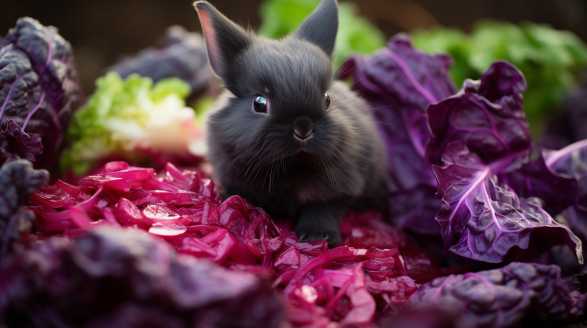
The World of Cabbage
Cabbage, a member of the Brassica family, is a nutritious vegetable popular across the globe. It’s packed with essential vitamins, minerals, and antioxidants that can benefit not only humans but also rabbits.
Red Cabbage and Green Cabbage, although similar, have a few notable differences that we’ll explore.
Red Cabbage: A Nutritional Powerhouse
1. Rich in Antioxidants
- Red cabbage gets its vibrant color from a high concentration of antioxidants called anthocyanins. These compounds help strengthen the immune system and reduce the risk of chronic diseases.
2. Jam-packed with Vitamins
- Vitamin C: Red cabbage contains more vitamin C than green cabbage, providing a boost to your rabbit’s immune system.
- Vitamin K: Crucial for bone health and blood clotting, this vitamin is found in abundance in red cabbage.
3. High Fiber Content
- Red cabbage is an excellent source of dietary fiber, which helps maintain healthy digestion and prevents gastrointestinal issues in your rabbits.
Green Cabbage: The Classic Choice
1. Moderate Fiber Content
- Green cabbage also contains a fair amount of fiber, aiding in your rabbit’s digestion and preventing stasis, a dangerous condition that affects their gastrointestinal tract.
2. Essential Vitamins and Minerals
- Vitamin C: Although not as abundant as in red cabbage, green cabbage still provides a decent dose of vitamin C.
- Vitamin K: Similar to red cabbage, green cabbage is rich in this essential vitamin that promotes bone health.
3. Versatile and Easily Available
- Green cabbage is widely available and often used in many rabbit-friendly recipes, making it a convenient staple for your furry friends.
The Rabbit-Ready Cabbage
Both red and green cabbage are generally safe for rabbits, but precautions must be taken to ensure their well-being. Before introducing cabbage into your rabbit’s diet, remember these essential guidelines:
1. Introduction
- Introduce cabbage gradually, starting with small quantities to allow your rabbit’s digestive system to adjust. Observe their response to ensure they tolerate it well.
2. Moderation is Key
- While cabbage is healthy for rabbits, it should be offered in moderation. Too much can cause bloating, gas, or even diarrhea. Keep portion sizes small and include a diverse diet.
3. Freshness is Crucial
- Always offer fresh cabbage to your rabbits. Avoid wilted or spoiled leaves as they can trigger digestive issues and even put your pet’s health at risk.
4. Organic or Home-grown Cabbage
- Whenever possible, opt for organic or home-grown cabbage to ensure your rabbits aren’t exposed to potentially harmful chemicals often present in conventionally grown produce.
5. Variety is the Spice of Life
- Don’t rely solely on cabbage as your rabbit’s main source of nutrients. A well-rounded diet consisting of hay, fresh vegetables, and high-quality rabbit pellets is essential for their overall health.
In the battle of Red Cabbage vs. Green Cabbage, it’s clear that both varieties can be enjoyed by rabbits when fed properly. However, the higher nutritional value of red cabbage, with its abundance of antioxidants, vitamins, and fiber, makes it a slightly more beneficial choice.
Happy Bunnies and Colorful Cabbages!
By embracing the wonder of cabbage, you can provide your rabbits with a balanced, nutritious, and exciting diet. Whether you choose the vibrant red or the classic green cabbage, be sure to follow the guidelines to keep your bunnies safe and healthy.
Red Cabbage and Rabbit Health: Should You Include it in Their Diet?
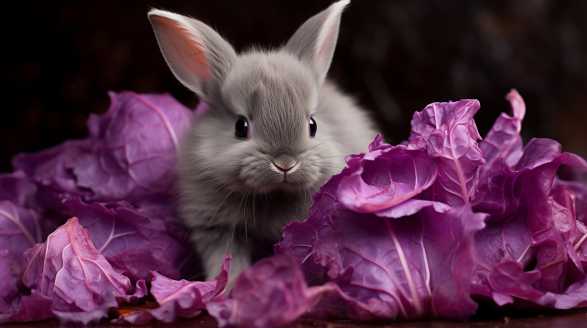
The Nutritional Powerhouse of Red Cabbage
Red cabbage is not only visually stunning but also a nutritional powerhouse. Packed with essential vitamins and minerals, it can provide various health benefits for both humans and animals alike.
- Vitamin C: Red cabbage is an excellent source of vitamin C, a crucial nutrient for rabbits. Vitamin C plays a vital role in collagen production, immune system function, and wound healing.
- Fiber: Fiber is essential for a healthy digestive system in rabbits. Red cabbage contains a significant amount of dietary fiber, which aids in maintaining regular bowel movements and prevents gastrointestinal issues.
- Antioxidants: Red cabbage is rich in antioxidants, such as anthocyanins, that help combat oxidative stress and support overall cellular health.
Red Cabbage and Rabbit Health: The Pros and Cons
Including red cabbage in your rabbit’s diet can have both benefits and drawbacks. Let’s take a closer look at the pros and cons to help you make an informed decision:
Pros
- Adds variety to the diet: Rabbits enjoy a diverse range of flavors and textures. Introducing red cabbage can enhance the overall eating experience for your furry friend.
- Boosts vitamin C intake: As mentioned earlier, red cabbage is an excellent source of vitamin C. Adding it to your rabbit’s diet can supplement their daily intake of this essential nutrient, aiding in overall health and well-being.
- Supports digestion: The high fiber content in red cabbage can promote healthy digestion in rabbits, helping prevent issues such as constipation.
Cons
- Gas and bloating: While some rabbits can tolerate red cabbage without any adverse effects, others may experience gas and bloating. It’s essential to monitor your rabbit closely when introducing red cabbage to their diet to ensure they do not develop any digestive issues.
- Moderation is key: Red cabbage should be given as an occasional treat rather than a primary food source. Too much cabbage can upset a rabbit’s delicate digestive balance.
Introducing Red Cabbage Responsibly
Now that we’ve explored the potential benefits and drawbacks of incorporating red cabbage into a rabbit’s diet, let’s discuss how to introduce it responsibly to ensure optimum health and safety for our beloved pets:
- Start Slow: Begin by offering small amounts of red cabbage to your rabbit, mixed with their regular diet. Monitor their reaction closely for any signs of digestive discomfort.
- Observe for digestive issues: Pay attention to your rabbit’s stool consistency and frequency after introducing red cabbage. Loose stools or a lack of bowel movements may indicate that red cabbage does not agree with your rabbit’s digestive system.
- Monitor overall health: Keep an eye on your rabbit’s well-being after introducing red cabbage. If you notice any changes in behavior or appetite, consult a veterinarian promptly.
Other Rabbit-Friendly Vegetables to Consider
If red cabbage doesn’t seem like the best fit for your rabbit, don’t worry! There are plenty of other rabbit-friendly vegetables that you can incorporate into their diet for added nutrition and variety.
- Carrots
- Spinach
- Romaine lettuce
- Kale
- Broccoli
Remember, it’s essential to introduce new vegetables gradually and monitor your rabbit’s response to ensure their digestive system remains healthy and happy.
When it comes to red cabbage and a rabbit’s diet, the ultimate decision lies in your hands. While red cabbage offers significant health benefits, it’s crucial to introduce it responsibly and in moderation.
Remember, your rabbit’s welfare should always be your top priority!
How to Introduce Red Cabbage to Your Rabbit’s Diet: Tips and Recommendations

Why Red Cabbage?
Red cabbage is a fantastic source of vitamins and minerals that can benefit your bunny’s overall health. Its high fiber content aids digestion, promotes a healthy gut, and keeps their teeth in good shape.
Remember, though, moderation is key. While red cabbage can be a delightful treat, it should not replace their main diet of hay, fresh water, and rabbit pellets.
Preparing Red Cabbage for Your Rabbit
Before offering red cabbage to your rabbit, it’s essential to properly clean and prepare it to ensure their safety. Here’s a step-by-step guide:
- Purchase fresh and organic red cabbage. Go for a firm head with crisp leaves and vibrant color.
- Wash the cabbage thoroughly under running water to remove any dirt or residue.
- Remove any wilted or damaged outer leaves.
- Using a sharp knife, separate a small portion of the cabbage head.
- Rinse the separated portion once again to ensure it’s clean and ready to be served.
Introducing Red Cabbage: Start Slowly
Rabbits have sensitive digestive systems, so it’s crucial to introduce new foods gradually. Here’s how you can do it:
- Begin by offering a small piece of red cabbage to your rabbit. Monitor their reaction and check for any adverse effects.
- If the cabbage is well-received after the first introduction, you can increase the portion size slightly the next time.
- Keep observing your rabbit’s behavior, especially their stool, for any signs of discomfort or digestive issues. If you notice any problems, discontinue feeding them red cabbage immediately.
Pairing Red Cabbage with Other Foods
To make red cabbage even more enjoyable for your bunny, consider combining it with other rabbit-safe foods. Here are some delightful pairings to try:
- Red cabbage and carrot slices
- Red cabbage and a small portion of apple
- Red cabbage and a few parsley leaves
- Red cabbage and a slice of bell pepper
- Red cabbage and a shred of baby spinach
What to Watch Out For
While red cabbage can add variety to your rabbit’s diet, there are a few precautions to keep in mind:
- Avoid feeding your rabbit red cabbage too often. It should be treated as a supplement or occasional treat, not a staple food.
- Introduce red cabbage gradually to monitor your rabbit’s reaction and ensure it suits their digestive system.
- Never feed your rabbit red cabbage that is spoiled, moldy, or wilted, as it could lead to gastrointestinal issues.
- If you have any concerns about offering red cabbage to your rabbit, consult a veterinarian for professional advice.
Introducing new foods to your rabbit’s diet can be an exciting and enriching experience for both of you. Red cabbage, with its plethora of nutrients and vibrant color, is undoubtedly a fantastic addition to your furry friend’s mealtime.
By following these tips and recommendations, you’ll create a diverse and balanced diet that will keep your rabbit happy and healthy. Bon appétit, little buns!
Conclusion
Wow, what a journey we’ve been on, exploring the colorful world of red cabbage for our adorable bunny companions! From its stunning purple leaves to its nutritional superpowers, red cabbage has proven to be an exciting addition to our rabbit’s diet.
I never realized just how much red cabbage could benefit my little munchkin! The vitamins, minerals, and antioxidants it provides are like a superhero team, fighting off free radicals and boosting my bunny’s immune system.
Who knew that such a simple vegetable could do so much?
Of course, introducing red cabbage to our rabbit’s diet comes with some careful consideration. We’ve learned the importance of starting slow and monitoring our bunny’s digestion and overall health.
It’s all about finding the right balance of flavors and nutrients to keep our furry companions happy and healthy.
But hey, if red cabbage isn’t your rabbit’s cup of tea, don’t worry! There are plenty of other rabbit-approved vegetables and leafy greens to explore.
The most important thing is to provide a varied and balanced diet that meets our bunny’s unique needs.
So, my fellow bunny enthusiasts, let’s hop into the kitchen and get creative with our rabbit’s meals. Red cabbage, with all its vibrant colors and health benefits, is just the beginning.
Here’s to happy hopping and delicious meals for our beloved bunnies! Cheers!
Frequently Asked Questions
Can rabbits eat red cabbage?
Yes, rabbits can eat red cabbage in moderation. It should be given as a treat and not as a staple food.
Is red cabbage safe for rabbits to eat?
Yes, red cabbage is safe for rabbits to eat as long as it is given in small amounts and not too frequently.
Why is red cabbage a good choice for rabbits?
Red cabbage is a good choice for rabbits because it is rich in nutrients such as vitamin C, fiber, and antioxidants. However, it should only be fed occasionally due to its high calcium content.
Can feeding red cabbage cause any health issues in rabbits?
Feeding red cabbage in excessive amounts can lead to digestive issues and gas in rabbits due to its high fiber content. It can also cause bladder problems in some rabbits due to its calcium content.
How should red cabbage be prepared for rabbits?
Red cabbage should be thoroughly washed and the leaves should be torn into small, bite-sized pieces to prevent choking hazards. It is best to introduce red cabbage slowly into a rabbit’s diet to see how they tolerate it.
How much red cabbage can I feed to my rabbit?
Red cabbage should be given to rabbits in small amounts as a treat, typically a few small leaves once or twice a week. It should never be a major part of their diet.
Are there any other vegetables that rabbits should not eat with red cabbage?
Rabbits should not be fed red cabbage in combination with other gas-producing vegetables such as broccoli, cauliflower, or Brussels sprouts, as it can increase the risk of digestive problems.
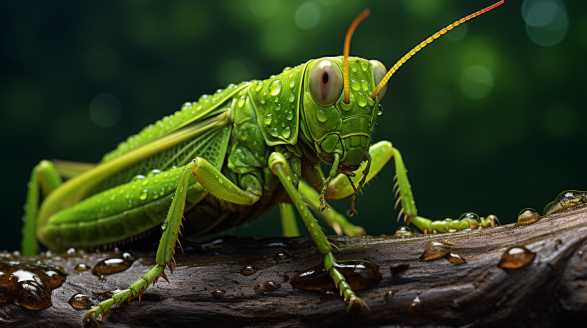
Do Rabbits Eat Grasshoppers
Introduction Do Rabbits eat grasshoppers? Find out in this comprehensive guide. As a nature enthusiast and devoted observer, I’ve spent countless hours studying the incredible relationship between rabbits and grasshoppers. My passion for these captivating creatures has led me on an adventure filled with surprising discoveries, irresistible delicacies, and even a few hidden dangers. In […]
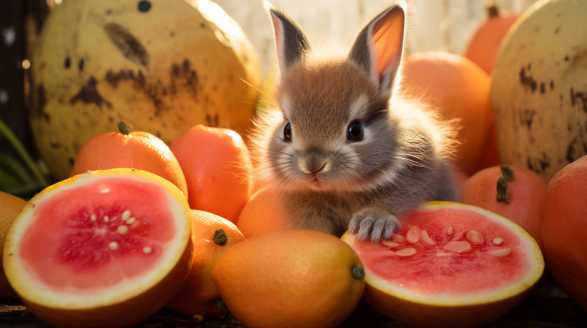
Can Rabbits Eat Grapefruit
Introduction Hey there, rabbit owners! If you’re anything like me, you’re always on the lookout for new ways to keep your furry friend happy and healthy. Yes, you heard it right, grapefruit for rabbits! Now, before you start scratching your head in confusion, let me assure you that grapefruit can actually be a great addition […]
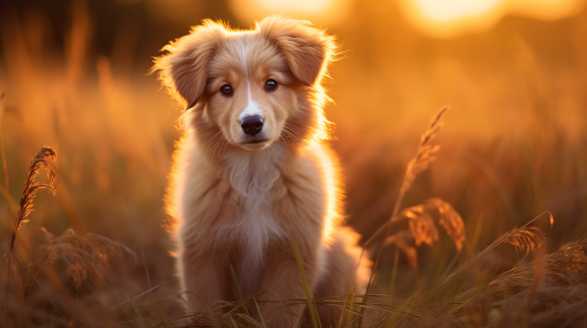
Do Rabbits Eat Dog Poop
Introduction If you’re a proud rabbit owner like me, you probably have a laundry list of questions about your furry friend’s peculiar habits. One question that has always stuck with me is why some rabbits have a tendency to eat dog poop. But the more I’ve researched this topic, the more fascinated I’ve become. I’ve […]
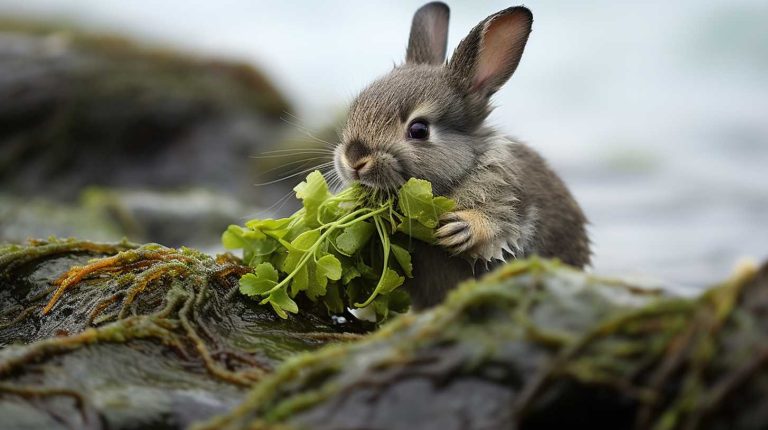
Can Rabbits Eat Seaweed
Introduction Hey there, rabbit owners! As fellow bunny enthusiasts, we know how important it is to provide our furry friends with a wholesome and nutritious diet. Yes, you heard it right – seaweed! You might be wondering, “Seaweed for rabbits? Is that even safe?” Well, we’ve done our research and we’re here to give you […]
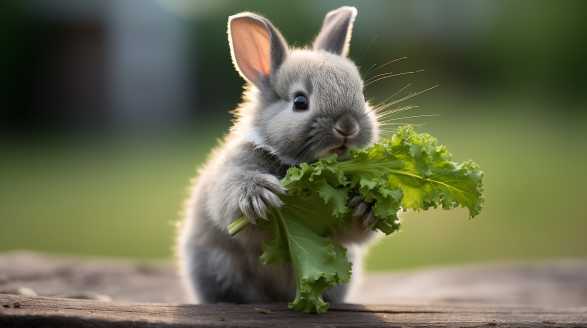
Can Rabbits Eat Kale
Introduction Can rabbits eat kale? Let’s find out. Now, picture this: fluffy bunnies bouncing around, their fur glistening in the sunlight, and their skin looking oh-so-smooth and radiant. Have you ever wondered what their secret is? Believe it or not, kale is not only a superfood for us humans, but it also packs a punch […]
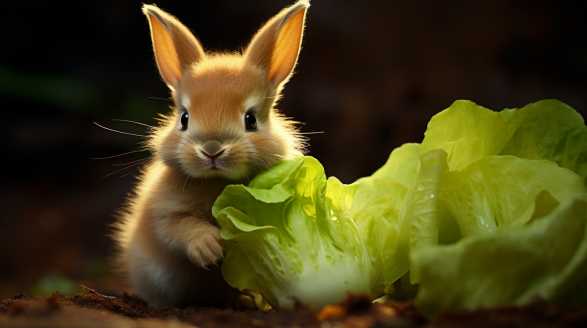
Can Rabbits Eat Butter Lettuce
Introduction Hey there, rabbit lovers! If you’re like me, you adore those adorable furry creatures and want nothing but the best for them. You may be wondering, why butter lettuce? Well, let me tell you, it’s not just for humans to enjoy in salads and sandwiches. we’re going to explore the nutritional benefits of butter […]
